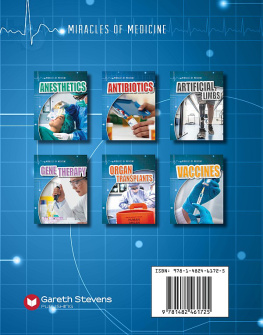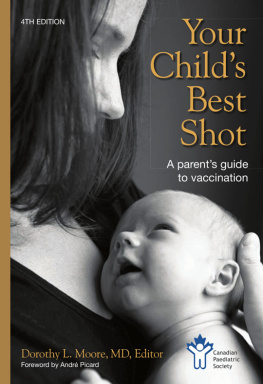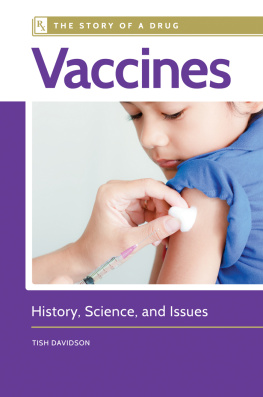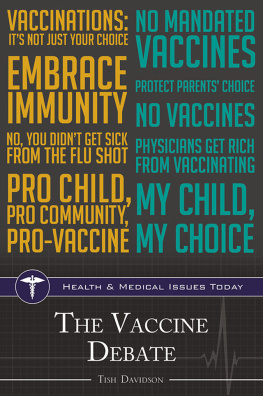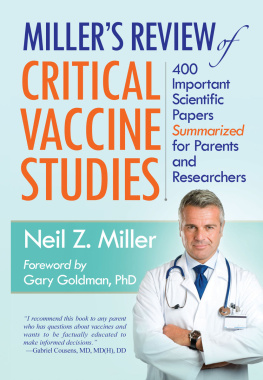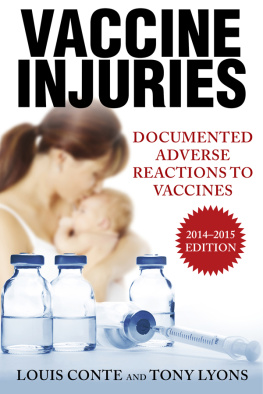Table of Contents
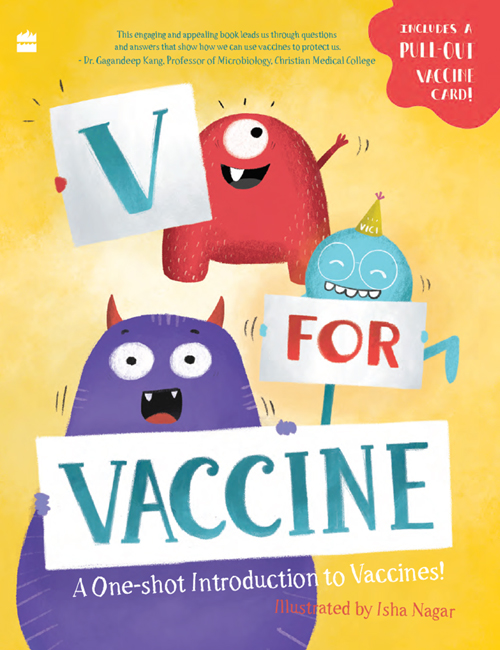

CONTENTS
Were
Veni, Vidi and Vici!

And most of all, we love talking about other things that start with Vlike Vaccines!
What is a vaccine?
A vaccine is a type of medicine that helps prevent illness.
How is a vaccine different from other medicines?
Some medicines are meant to be taken after you fall sick. For example, if you have a fever, you can take medicines to help you get better. Vaccines teach your body to recognize and fight certain germs that make you ill, such as chickenpox or measles, so that you dont get sick.

Why do we need vaccines?
Germs like bacteria and viruses can cause infectious diseases that spread very easily. Vaccination is one of the best ways to prevent this. When enough people are vaccinated, these diseases cant spread anymore. We have even managed to get rid of some diseases, like smallpox, by vaccinating people.
How are vaccines given?
In most cases, vaccines are given by an injection in the arm or leg, but they can also be given as drops to swallow or a spray in the nose.
What is vaccination?
The process of giving or getting a vaccine is called vaccination. This is also called immunization, because vaccines give you immunity or protection from certain diseases caused by germs.
What is immunity?
When your body is protected from infections, you have immunity or protection. Our bodies protect us in many ways, using the immune system.

What is the immune system?
The immune system consists of different parts of the body, such as cells and organs, all working together to protect us from bacteria, viruses and other germs that can make us sick.
Your body knows how to protect you from some diseases from the time youre born. For example, your skin prevents certain germs from entering your body. Our bodies also have ways of recognizing when something is foreign, even if we havent come across it before. This is known as innate immunity. Another form of immunity is acquired immunity, which people develop from being exposed to different germs.
What are antibodies?
When harmful substances like viruses, bacteria or other germs enter our bodies, the immune system recognizes these invaders. It fights them off by producing substances called antibodies.
An antibody is a protein thats shaped a little like a Y. When a virus, bacteria or germ enters your body, the immune system makes antibodies in response to the germ. These antibodies can attack the germs directly, or act indirectly by getting other parts of the immune system to respond. Antibodies are one of the most important elements of our immune system.
Your immune system also has a great memory! It remembers these germs so that the next time they try to attack, your body knows the right kind of antibodies to produce.

What do vaccines do?
Vaccines are like infections, except that they dont make you sick. Instead, the immune system thinks that a germ has arrived and responds to protect you. Vaccines are a clever way of teaching your body how to fight off germs that havent tried to attack you yet, so that the first time these germs try to make you feel sick, your immune system is already prepared!

Do vaccines cure diseases?
By helping you develop immunity to a disease, vaccines stop you from falling sick in the first place. This means that they dont cure diseases, they stop them from happening. This is great not just for the person who has been vaccinated but for their family and community as well because there will be fewer sick people around to spread the disease. No cure, but lots of reduction.
Where did vaccines come from?
The idea of using a small, weak dose of a virus, germ or toxin to build your immunity has actually been around for centuries! For smallpox, this practice was followed in different parts of the world, including China, Turkey, India and some countries in Africa. However, the kind of vaccines that are used today were developed around 1796.

When was the first vaccine created?
An English scientist named Edward Jenner is known as the inventor of the first vaccine. Around 1796, Edward Jenner used material from cowpox as a vaccine in order to give people immunity from smallpox. Soon, this vaccine was given to people around the world. Thanks to the smallpox vaccine, this deadly disease is no longer a threat!
How are vaccines made?
There are many steps taken to make sure that a vaccine is safe and works before it is ready to be used by people. Vaccines contain a number of ingredients, but the most important is a part or whole of the germ that causes illness. These are called antigens.

What is an antigen?
The antigen is the element of the vaccine that triggers the bodys immune response. It is usually a small part of a bacteria or virus. This antigen teaches the immune system how to recognize and fight off the bacteria or virus. The antigen cannot give you the disease it just tells your body what to look out for.
What happens after a vaccine is created?
After a vaccine is created, it has to be tested so that scientists can prove that it works. All vaccines are tested using similar processes, so that doctors and scientists can be sure that they are safe and effective to use. Once the right antigen is identified and scientists have carried out tests in their laboratories, the vaccines are tested, first on animals and then on human volunteers.
This happens in three different stages. Thousands of people receive the trial vaccine, and scientists monitor them to make sure that the vaccine is safe, makes the right kind of immune response and protects from illness. These trials often happen in different countries at the same time. Next, scientists and experts review the results from all these trials. If the vaccine is shown to be safe and to produce immunity, it is approved.

What are some popular vaccines?
Lots of vaccines have been approved and been in use for many years, all over the world. For example, there are vaccines for diseases such as chickenpox, measles, mumps, polio and tetanus. Some of these diseases used to be very dangerous, but thanks to vaccination, we can stay safe and develop immunity to them from a very young age.


